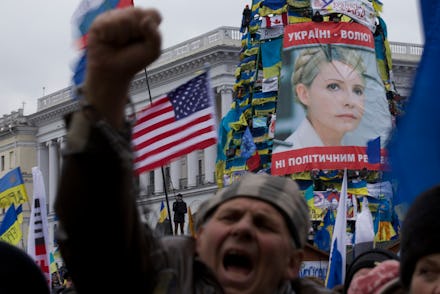Yulia Tymoshenko Isn't Who You Think She Is

"Yesterday I was simply ready to kill you."
With these words, Ukraine's former Prime Minister, Yulia Tymoshenko, jailed for allegedly exceeding her authority, addressed her letter to Ukraine's President Viktor Yanukovych after the decision to postpone the signing of agreements with the European Union that promised to bring Ukraine closer to Europe. The decision sparked a wave of peaceful protests across Ukraine, known as the Euromaidan Movement, which has grown significantly in numbers, at times hovering around a million or more in the capital alone. In a few days, the protests will enter their fourth week.
Tymoshenko is a controversial figure. Abroad she is revered for her charisma and style (her iconic crown braid hair has been copied by fashionistas across the globe). At home she is viewed as a blessing and curse, depending on who you ask: a blessing because of her strongwoman approach, relentless fight against oligarchy and opaque energy traders that have plagued Ukraine's economy since the 1990s, and a curse because of her populist policies rather than genuine reform while in the government. But few regard her imprisonment in 2011 as anything but a politically-motivated persecution by current Yanukovych, who seems to be afraid of her. By a narrow margin of 3.5%, she lost an election to him in 2010.
Despite her popularity in the Western, Northern, and Central regions of Ukraine, and her influence (she has topped the Focus list of the most powerful women in Ukraine for eight years in a row), her trial and a several-year sentence starting August 2011 did not ignite an uprising. Instead, most Ukrainians disapproved of the regime's actions, but did little to release her from the Kharkiv penitentiary. However, during the last two years, the EU and the international community became Tymosheko's main allies.
One of the reasons why the negotiations over the signing of the free trade and association agreements with the EU have been so difficult is because the EU has unofficially tied Tymosheko's release to the successful signing of the deal. In the months and weeks prior to the fateful decision to postpone negotiations, the EU mission, composed of Pat Cox, former president of the European Parliament, and Aleksander Kwaniewski, former president of Poland, travelled regularly to Kyiv hoping to find a compromise to the problem.
The EU's position extended beyond the case of Tymoshenko and towards the general semi-authoritarian trajectory of Ukraine under President Yanukovych, where selective justice was a norm and had to be reformed if the country wanted to integrate with the EU. A solution was near and offered to modify existing Ukrainian laws to allow prisoners to be treated abroad when their health conditions required it (while in prison, Tymoshenko was diagnosed with a spinal disc herniation). On November 21, the parliament failed to pass the necessary laws and the government's decision to halt negotiations with the EU followed.
During this saga, the Ukrainian people stood on the sidelines. They did not approve of Tymoshenko's imprisonment and most understood that the selective system of justice, whereby opponents use courts to solve political differences, is neither civilized nor European. Tymoshenko has sent mixed messages about this conditionality imposed by the EU, but in the run-up to the final decision she has made it explicit that she would rather stay in prison and have the agreement signed than remain an impediment in the process. Rumors from the EU indicated as much. So, while the Tymoshenko problem might have been one of the reasons why the president suspended EU negotiations, it certainly wasn't the main one.
Ongoing protests are not about Tymoshenko. Although, how she was treated has further undermined people's trust in the president and his regime, and this is reflected in their calls to keep politics (existing slogans of political opposition) out of Maidan. As an example, a petition was recently started on Avaaz to remove her portraits from the infamous Christmas tree. Currently, people see existing political opposition, including Tymosehko's "Fatherland" party, as part of the political problem rather than its solution. However, as of yet, the civil society is unable to offer new leaders of their own. A workable solution will have to come from their collaboration, but an effective recipe has yet to be found.
In the meantime, one thing most protesters would agree with is that if Tymoshenko was free, she would have been better equipped than most to provide leadership during the protests, and likely, by now, would have overthrown the regime.